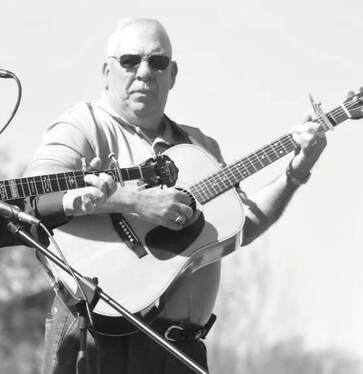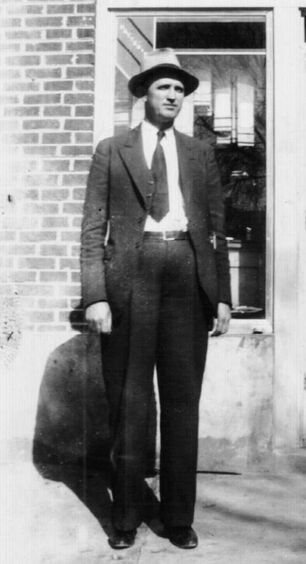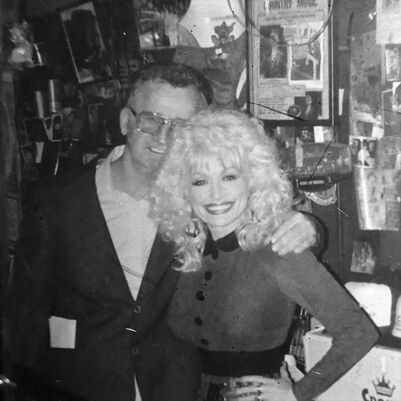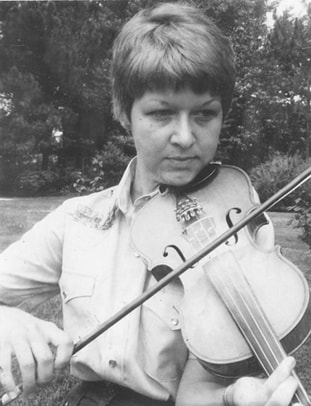Rudy Moore
Influential Bluegrass Guitarist and Band Leader

As read by Brandon Moore, Son of the inductee
June 11, 2021
There wasn’t much to do in Finger, Tennessee when Rudy Lyles Moore was growing up in the 1950s. The sun up to sundown demands of farm life kept him busy most of the time, and an occasional Sunday afternoon baseball game in the pasture provided a welcome diversion. But, while Finger may have been a sleepy little midcentury town, there was something rather remarkable happening in the Moore household; something that brings us together tonight to honor Rudy Moore. That something was homegrown bluegrass music.
Before he could walk, young Rudy was exposed to the sounds of traditional music in his home. And it didn’t hurt matters that Bill Monroe, Ralph Stanley and Flatt and Scrugs, among other bluegrass greats, reached Finger through the Grand Ole Opry and other regional radio programs. Bluegrass was a constant, and Rudy was even named for one of Bill Monroe’s banjo pickers, Rudy Lyles. That should be enough to tell you that the music that resonated in their home was more than good foot tapping entertainment for the Moore family; it was a passionate pursuit.
Rudy’s father, Millard, was a good mandolinist who encouraged the Moore children’s interest in music, while Rudy’s mother, Maggie, joined in on vocals. The family often made music together and sought out opportunities for the kids to hear and play with others. In the mid 1950s McNairy County had one of the hottest local music scenes in the region and Millard was a frequent participant in musical jams, community dances and other live performances. Of course, Rudy was right there with him and took to music like a duck to water. When his hands were still too small to fret a guitar, he would snatch up a broom and imitate the pickers he saw at the local jams. He traded in the broom for the real thing by the time he was 5 or 6 years old and it didn’t take him long to get the hang of it.
Rudy listened closely to his musical heroes on the radio and played favorite recordings over and over, working out the chord changes and jotting down the lyrics on anything handy until he could memorize the tunes in full. He recalls literally playing until his fingers bled, but the dedication soon paid off. As his skills grew his devotion to traditional music became ever more apparent. His excellent technique and expanding bluegrass repertoire was getting him noticed outside the Moore family.
By the time he was a teenager, Rudy had caught the attention of one of McNairy County’s preeminent Bluegrass families, the Murrays, in nearby Bethel Spring—Murray Hill to be more precise. Inducted into the Hall of Fame 2019, Virgil, Tom and Bruce Murray were eager to put Rudy to work in their family band, The Murray Boys. He logged a lot of hours playing with the Murrays, and would later return to Murray Hill to play the Murray Hill Jamboree, but by the 1970s his hometown of Finger was suddenly in the local music spotlight.
In the 1970s the Finger Square Dance, anchored by 2015 Hall of Fame honoree, Ernest “Pappy” Whitten, was in full swing drawing traditional musicians and dancers from around the region. Rudy, of course, was right in the middle of it, playing with Pap’s legendary Chickasaw Ramblers. Pap’s bands had always attracted some of the area’s best pickers, but the younger generation of artists surrounding Pap in that period was especially noteworthy, producing a number of Hall of Fame inductees which now includes Rudy Moore. Pap’s two gifted sons, Ronnie and Wayne Whitten, were core members of the band, as was 2018 Hall of Famer, David Killingsworth. These younger pickers had a slightly different musical vision and soon began collaborating on a new project with a more contemporary direction. As The Whitten Brothers Band they became one of the region’s hottest young bluegrass acts attracting a devoted following of younger fans to festivals and local bluegrass shows like the Murray Hill Jamboree for the better part of a decade.
In response to a thriving regional bluegrass circuit in the 1980s Rudy formed the Bluegrass Pals. Rudy’s easy going personality, natural way with people and commitment to the bluegrass tradition made him a perfect bandleader. From the first day they got together until now, the Bluegrass Pals have traveled thousands of miles across the Southern states performing at weekend festivals and events, preserving the old tunes Rudy and the other band members learned as young McNairy County musicians. And what a list of musicians it is! Like his mentors, Pap Whitten and The Murray Boys, Rudy never seemed to run out of talented pickers. For more than thirty years now he has kept an impressive lineup of topflight musicians rounding out the Bluegrass Pals. Hall of Fame inductee David Killingsworth is former Bluegrass Pal. Notable member over the years include: Robert Taylor, Keith Taylor, Kevin Keen, Bobby Isbell, Scottie Baugus, Steve Killingsworth, and a number of others. Johnny Leatherwood, who passed away in 2013, was a mainstay of the Bluegrass Pals who deserves special mention for the lasting impact he made on the band and virtually everyone who heard them play during his tenure.
Home was never far from Rudy’s mind while he was entertaining at faraway festivals in neighboring states. He always dreamt of having a bluegrass festival here in McNairy County. So, in the 1980s and 90s Rudy rolled up his sleeves and went to work making the dream a reality. He was instrumental in organizing and playing for local festivals and shows in Eastview, Guys, and Big Hill Pond State Park. The Pals were also regulars at the popular Adamsville Bluegrass Jamboree for a number of years where they were always fan favorites.
Rudy has performed at countless benefits, fundraisers and church singings around the area. He was a regular at the popular Leapwood Dance and sang bass with the Harvest Quartet. He lent his talent to numerous other area bands and put in countless hours on a flattop guitar at back porch—and sometimes even front porch—pickin’ sessions. The truth is, it’s impossible to know how many times and places Rudy has performed in sixty-five years of music making, but a few things are certain: it always good pickin’; it was always true to his McNairy County roots; and it always came straight from the heart. By just doing what came naturally, Rudy Moore brought the local music tradition forward into a new generation and he is still getting it done today, as you will soon hear. He has done more than his part to keep traditional bluegrass alive and well in our part of the world, and for that, we owe him a debt of gratitude.
In 1960, Flatt and Scruggs recorded a song that seems appropriate for occasions such as this. The tune I’m think of is titled “Give Me My Flowers While I’m Living.” It speaks of honoring people while they are still around to know that they are deeply appreciated by their friends, family—and in this case fans—rather than heaping praise on them when they are gone. We don’t have a bouquet for Rudy tonight, but we do have hearts full of thanksgiving for the joy he has spread in lifetime of making music and making memories. And in our gratitude, we recognize him on this occasion with the highest honor McNairy County bestows for musical excellence.
It is my great privilege to induct, my dad, Rudy Moore into the McNairy County Music Hall of Fame in the class of 2021.
June 11, 2021
There wasn’t much to do in Finger, Tennessee when Rudy Lyles Moore was growing up in the 1950s. The sun up to sundown demands of farm life kept him busy most of the time, and an occasional Sunday afternoon baseball game in the pasture provided a welcome diversion. But, while Finger may have been a sleepy little midcentury town, there was something rather remarkable happening in the Moore household; something that brings us together tonight to honor Rudy Moore. That something was homegrown bluegrass music.
Before he could walk, young Rudy was exposed to the sounds of traditional music in his home. And it didn’t hurt matters that Bill Monroe, Ralph Stanley and Flatt and Scrugs, among other bluegrass greats, reached Finger through the Grand Ole Opry and other regional radio programs. Bluegrass was a constant, and Rudy was even named for one of Bill Monroe’s banjo pickers, Rudy Lyles. That should be enough to tell you that the music that resonated in their home was more than good foot tapping entertainment for the Moore family; it was a passionate pursuit.
Rudy’s father, Millard, was a good mandolinist who encouraged the Moore children’s interest in music, while Rudy’s mother, Maggie, joined in on vocals. The family often made music together and sought out opportunities for the kids to hear and play with others. In the mid 1950s McNairy County had one of the hottest local music scenes in the region and Millard was a frequent participant in musical jams, community dances and other live performances. Of course, Rudy was right there with him and took to music like a duck to water. When his hands were still too small to fret a guitar, he would snatch up a broom and imitate the pickers he saw at the local jams. He traded in the broom for the real thing by the time he was 5 or 6 years old and it didn’t take him long to get the hang of it.
Rudy listened closely to his musical heroes on the radio and played favorite recordings over and over, working out the chord changes and jotting down the lyrics on anything handy until he could memorize the tunes in full. He recalls literally playing until his fingers bled, but the dedication soon paid off. As his skills grew his devotion to traditional music became ever more apparent. His excellent technique and expanding bluegrass repertoire was getting him noticed outside the Moore family.
By the time he was a teenager, Rudy had caught the attention of one of McNairy County’s preeminent Bluegrass families, the Murrays, in nearby Bethel Spring—Murray Hill to be more precise. Inducted into the Hall of Fame 2019, Virgil, Tom and Bruce Murray were eager to put Rudy to work in their family band, The Murray Boys. He logged a lot of hours playing with the Murrays, and would later return to Murray Hill to play the Murray Hill Jamboree, but by the 1970s his hometown of Finger was suddenly in the local music spotlight.
In the 1970s the Finger Square Dance, anchored by 2015 Hall of Fame honoree, Ernest “Pappy” Whitten, was in full swing drawing traditional musicians and dancers from around the region. Rudy, of course, was right in the middle of it, playing with Pap’s legendary Chickasaw Ramblers. Pap’s bands had always attracted some of the area’s best pickers, but the younger generation of artists surrounding Pap in that period was especially noteworthy, producing a number of Hall of Fame inductees which now includes Rudy Moore. Pap’s two gifted sons, Ronnie and Wayne Whitten, were core members of the band, as was 2018 Hall of Famer, David Killingsworth. These younger pickers had a slightly different musical vision and soon began collaborating on a new project with a more contemporary direction. As The Whitten Brothers Band they became one of the region’s hottest young bluegrass acts attracting a devoted following of younger fans to festivals and local bluegrass shows like the Murray Hill Jamboree for the better part of a decade.
In response to a thriving regional bluegrass circuit in the 1980s Rudy formed the Bluegrass Pals. Rudy’s easy going personality, natural way with people and commitment to the bluegrass tradition made him a perfect bandleader. From the first day they got together until now, the Bluegrass Pals have traveled thousands of miles across the Southern states performing at weekend festivals and events, preserving the old tunes Rudy and the other band members learned as young McNairy County musicians. And what a list of musicians it is! Like his mentors, Pap Whitten and The Murray Boys, Rudy never seemed to run out of talented pickers. For more than thirty years now he has kept an impressive lineup of topflight musicians rounding out the Bluegrass Pals. Hall of Fame inductee David Killingsworth is former Bluegrass Pal. Notable member over the years include: Robert Taylor, Keith Taylor, Kevin Keen, Bobby Isbell, Scottie Baugus, Steve Killingsworth, and a number of others. Johnny Leatherwood, who passed away in 2013, was a mainstay of the Bluegrass Pals who deserves special mention for the lasting impact he made on the band and virtually everyone who heard them play during his tenure.
Home was never far from Rudy’s mind while he was entertaining at faraway festivals in neighboring states. He always dreamt of having a bluegrass festival here in McNairy County. So, in the 1980s and 90s Rudy rolled up his sleeves and went to work making the dream a reality. He was instrumental in organizing and playing for local festivals and shows in Eastview, Guys, and Big Hill Pond State Park. The Pals were also regulars at the popular Adamsville Bluegrass Jamboree for a number of years where they were always fan favorites.
Rudy has performed at countless benefits, fundraisers and church singings around the area. He was a regular at the popular Leapwood Dance and sang bass with the Harvest Quartet. He lent his talent to numerous other area bands and put in countless hours on a flattop guitar at back porch—and sometimes even front porch—pickin’ sessions. The truth is, it’s impossible to know how many times and places Rudy has performed in sixty-five years of music making, but a few things are certain: it always good pickin’; it was always true to his McNairy County roots; and it always came straight from the heart. By just doing what came naturally, Rudy Moore brought the local music tradition forward into a new generation and he is still getting it done today, as you will soon hear. He has done more than his part to keep traditional bluegrass alive and well in our part of the world, and for that, we owe him a debt of gratitude.
In 1960, Flatt and Scruggs recorded a song that seems appropriate for occasions such as this. The tune I’m think of is titled “Give Me My Flowers While I’m Living.” It speaks of honoring people while they are still around to know that they are deeply appreciated by their friends, family—and in this case fans—rather than heaping praise on them when they are gone. We don’t have a bouquet for Rudy tonight, but we do have hearts full of thanksgiving for the joy he has spread in lifetime of making music and making memories. And in our gratitude, we recognize him on this occasion with the highest honor McNairy County bestows for musical excellence.
It is my great privilege to induct, my dad, Rudy Moore into the McNairy County Music Hall of Fame in the class of 2021.


